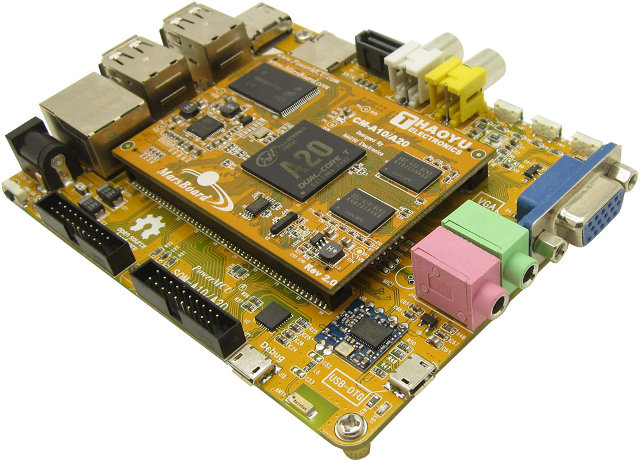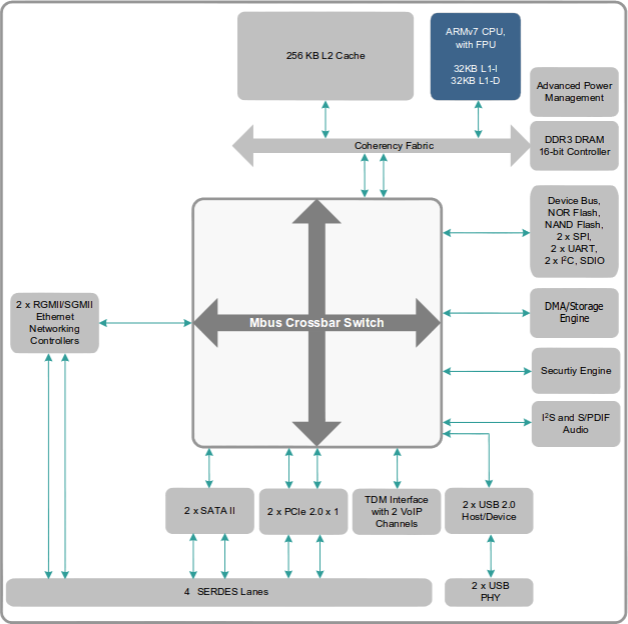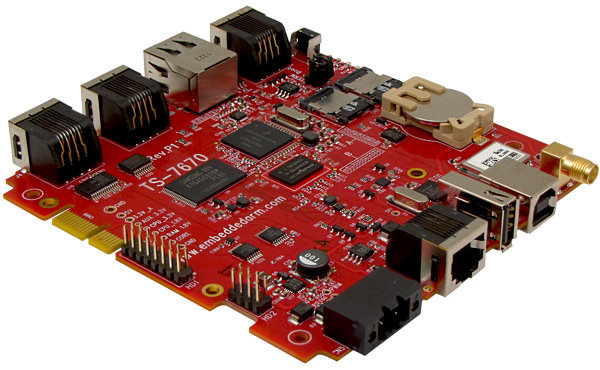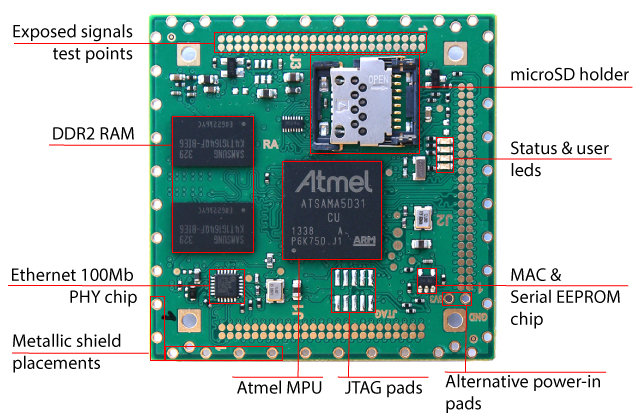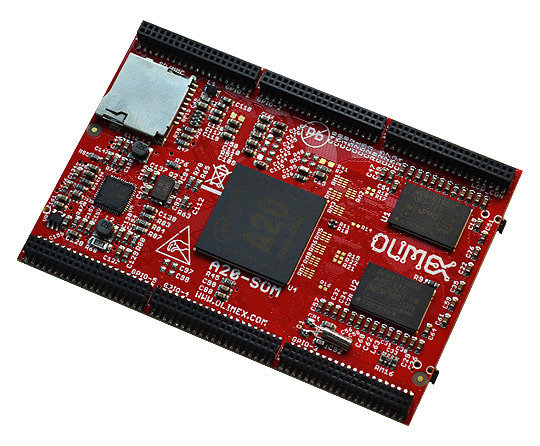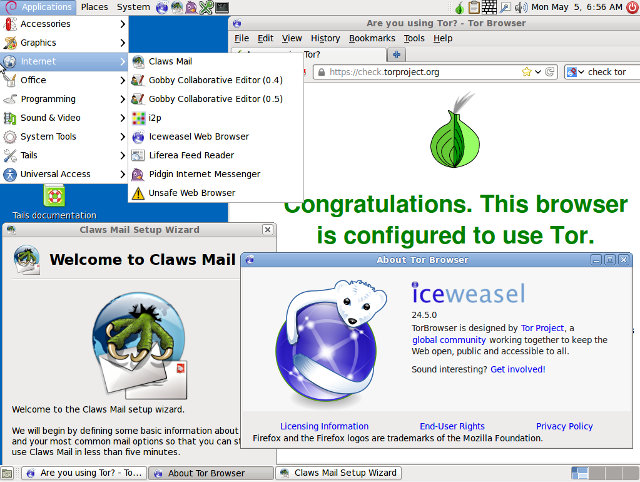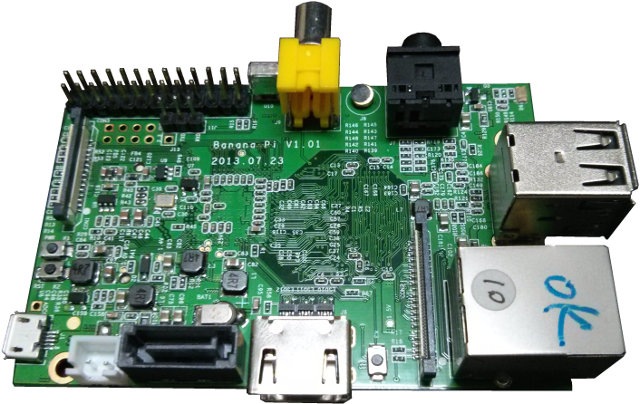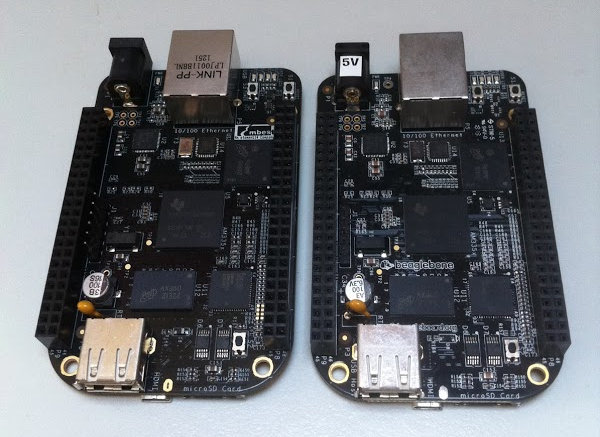MarsBoard, a development board based by AllWinner A10 was released last year, soon followed by MarsBoard A20 with a dual core Cortex A7 AllWinner A20 processor. That board is now called the “Old MarsBoard A20” and is replaced by the “New MarsBoard A20” that features a baseboard + computer-on-module design, increases the NAND flash capacity to 8 GB flash, and supports 1GB RAM by default, with an option for 2 GB RAM. Let’s check the specifications of this new development board: SoC – AllWinner A20 ARM Cortex A7 dual core processor @ 1GHz + Mali-400 GPU System Memory – 1GB DDR3 @ 480 MHz by default, up to 2GB DDR3 Storage – 8GB NAND Flash, SATA II interface, and micro SD slot Video I/O HDMI up to 1080p60 VGA Composite output TV-IN (composite IN) LCD connectors for RGB and LVDS interfaces, capacitive touch support Audio I/O – HDMI, Line In/Out, Microphone […]
Marvell Armada 370 Processor Datasheet Released, Mainline Linux Kernel Supported on Netgear ReadyNAS 102/104
Free Electrons has been working on porting several ARM SoC to the Linux kernel (mainline), including Marvell XP and 370 SoCs, and they’ve been informed by Marvell that the company finally released Marvell Armada 370 processor publicly without requiring NDA nor registration. Marvell Armada XP dual and quad core processors datasheet found in higher-end NAS and cloud servers has not been released (yet), but we’ve been told many peripheral blocks are very similar, so Marvell Armada 370 datasheet can also be used for Armada XP processors to some extend. Two documents have actually been released for Marvell Armada 370: the functional specification and the hardware specification (datasheet). The first document is actually the one with the most information with 1148 pages providing details about peripherals, against 164 pages for the latter providing details about pins and electrical characteristics. So we’ve got an ARM SoC with mainline kernel support, and decent […]
Technologic Systems TS-7670 Industrial Board Features Freescale i.MX286, Supports RAID-like System on SD Cards
Technologic Systems has unveiled an industrial board powered by Freescale i.MX286 ARM9 processor and a MCU part of NXP LPC1100 Cortex M0 series to to create a CDC ACM serial device on a host PC, and interfaces via UART, I2C, and SPI with the Freescale processor. The board targets applications such as fleet vehicle or asset tracking, point-of-sales (PoS), vending machines, data acquisition units, and data recorder modules. TS-7670 specifications: Processor – Freescale i.MX286 (1x ARM926EJ-S core @ up to 454MHz) MCU – NXP LPC Cortex M0 MCU in QFN32 package (LPC1114??) System Memory – 128MB to 256MB DDR2 RAM Storage – 2GB soldered NAND flash, 2x microSD slot with Doublestore support (similar RAID on SD card) Connectivity – 10/100 Ethernet port Wireless – Optional Telit Jupiter series multi-constellation GPS; optional CDMA, GPRS, or HSPA+ modules USB – USB host port, USB OTG port Other I/Os: 2x RS-232/interfaces (optional TTL […]
Acme Systems Acqua A5 is a System-on-Module Powered by Atmel SAMA5D3 Processor
Acme Systems has announced availability of their Acqua A5 SoM with Atmel SAMA5D31 Cortex A5 micro-processor, up to 512 MB RAM, up to 256 MB Flash, a serial EEPROM, a micro SD card slot, and an Ethernet PHY. The module targets headless or LCD based system such as automation or control panels, and is available in commercial and extended temperature range. Specifications: Processor – Atmel SAMA5D31 ARM Cortex-A5 MPU @ 536MHz System Memory – 256MByte DDR2 RAM @ 32 bit (optionally 512MB) Storage Embedded micro SD hinge type holder for OS and data Optional 256 MB NAND flash Atmel AT24MAC402 – 2Kbit serial EEPROM Connectivity – 10/100 Mbit Ethernet I/F (can be turned off for power saving) Three USB Host ports (one configurable as USB device) Connectors – 3x 50-pin connectors pitch 1.27 mm (50 mils) Signal accessible via connectors: (Check pinout for details) 10/100 Mbit Ethernet phy RGB I/F […]
Olimex Introduces Low Cost AllWinner A13, AllWinner A20 and TI Sitara AM3352 Systems-on-Module
About a year ago, Olimex reported working on an AllWinner A20 System-on-Module. But after some unexpected delays, Olimex A20-SOM is finally available, and they’ve even announced A13-SOM and AM3352-SOM, respectively based on AllWinner A13 and Texas Instruments Sitara AM3352 ARM Cortex A8 SoCs, with price starting at 12 Euros for 1K orders. Olimex A20-SOM and A20-SOM-4G There are actuall two versions of the SoM, A20-SOM-4G including 4GB NAND flash, and A20-SOM without. Here are the specifications: SoC – AllWinner A20 dual core ARM Cortex A7 processor with Mali-400MP2 GPU System Memory – 1GB DDR3 memory Storage – 4GB NAND Flash (A20-SOM-4G only) + microSD slot Debugging – UART console connector (at the back) PMIC – AllWinner AXP209 PMU IC Misc – Status LEDs, RESET, RECOVERY buttons Connectors – 6x 2×20 pin 0.05″ female headers Dimensions – N/A The SoM is said to support Android and Debian, but you could also […]
A Quick Test Drive of Tails, a Privacy Focused Linux Distribution
Tails (The Amnesic Incognito Live System) is a Linux distribution that allows you to use the Internet anonymously and circumvent censorship via the Tor network. It leaves no trace, and is said to use “state-of-the-art” cryptographic tools to encrypt files, emails and instant messages. It’s distributed as a live image that boots from a DVD drive, a USB stick, or an SD card. Tails v1.0 has recently been released. so let’s give it a quick try. Tails is currently only available for x86 (32-bit), no ARM image yet. The source code is available via a git repo. Let’s download the ISO image (mirror), and signature. Alternatively you can download both via BitTorrent. To make sure the image is not compromised it’s recommend to verify the integrity of the ISO image with the signature we’ve just downloaded. You’ll also need a signing key The are several methods, but I’ve opened a terminal, […]
Banana Pi is a Raspberry Pi Compatible Board fitted with an AllWinner A20 SoC
So you’ve got a Raspberry Pi board, an enclosure, and a few add-on boards. Your application would however do with some more processing power, or you’d like to run Android, but you don’t want to have to purchase accessories all over again for another board. Banana Pi could be the solution, as it’s apparently [Update: it’s not. See comments] mechanically and electrically compatible with the Raspberry Pi, and comes with a dual core Cortex A7 AllWinner A20 SoC with 1GB RAM, a Gigabit Ethernet port, and a SATA port, among other things. The board does indeed look familiar, with all external connectors at the exact same positions, but the hardware specs are fairly different: SoC- Allwinner A20 dual core Cortex A7 processor @ 1 GHz with Mali-400MP2 GPU System Memory – 1 GB RAM Storage – SD card slot, SATA connector Video output – HDMI, Composite, and LVDS/RGB Audio I/O […]
BeagleBone Black Gets 4GB Flash, a Price Increase, and Better Availability
The BeagleBone Black has been launched about a year ago, and this low cost ARM Linux board has become pretty popular with hobbyists, robotics courses at universities, and even people making products. The downside is that it has been difficult for CircuitCo, the manufacturer, to keep producing enough boards to match the demand while keeping the price at a low $45 with very little margin, and there are currently about 150,000 boards on distributor back-orders. To improve availability, Beagleboard.org has announced Revision C of the BeagleBone Black with a 4 GB eMMC, which may be easier to source over time than the original 2 GB eMMC, and that will sell for about $5 to $15 more than the previous version, or between $50 and $60. The rest of the hardware specifications remain identical. There’s also a change on the software side, as the board will be pre-loaded with Debian, instead […]


